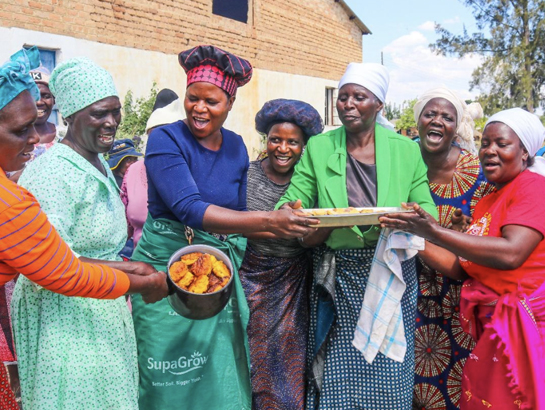Like many lower-middle-income countries, Zimbabwe faces the challenge of hidden hunger. An estimated 20 percent of children under five suffer from vitamin A deficiency, while over 72 percent of children and 69 percent of women of reproductive age experience iron deficiency. These nutritional gaps lead to weakened immunity, impaired vision, and increased mortality rates, costing the country more than USD 24 million annually in lost Gross Domestic Product (GDP).
To combat this crisis, HarvestPlus, with support from the Government of Canada, is leading the Expanding Nutrients in Food Systems (ENFS) project. This initiative educates smallholder farmers, school teachers, children, and community members on the importance of nutritious diets and the benefits of biofortified crops, demonstrating how to incorporate them into everyday meals.
Cooking Demonstrations: A Hands-On Approach to Better Nutrition
The project introduces an innovative training method—cooking demonstrations—that teach households how to prepare diverse, delicious, and nutrient-rich meals using biofortified crops such as vitamin A maize, vitamin A orange sweet potatoes, and iron beans.
“Before attending the cooking demos organized by HarvestPlus, I didn’t realize how much our diet impacts our health,” said Irene Chikonyora, a smallholder farmer from Bindura, Zimbabwe. “Now, I feel confident preparing meals that are not only tasty but also packed with essential vitamins, iron, and zinc for my family.”
Real Impact on Families and Communities
The cooking demonstrations have sparked a significant shift in attitudes toward nutrition. Rose Pitoni, another smallholder farmer, shared, “I never imagined that vitamin A orange sweet potato and vitamin A maize could help prevent night blindness in children. Thanks to HarvestPlus, I now know how to incorporate these crops into our daily meals in ways my children love.”
For school children, the sessions have been equally enlightening. “I used to think healthy food was boring,” said Agness Manjarusa, a 16-year-old student from Whaddon Chesi Secondary School in Bindura. “But after learning to make iron bean balls, sweet potato fritters, cakes, and biscuits with biofortified crops, I look forward to eating healthy snacks every day. My siblings and I will be bringing them to school from now on.”
“Our goal is to empower smallholder farmers to incorporate biofortified crops into their daily meals and share the benefits with their families,” explained Memory Gaveta, a HarvestPlus cooking demo facilitator. “Through these demonstrations, many farmers discovered that vitamin A maize can be used in various dishes, from traditional sadza to baked goods like cakes.”
The ENFS project has made a noticeable impact on communities. To date, over 1,000 farmers from Bindura, Mt. Darwin, Guruve, and Mazowe have participated in cooking demonstrations. These farmers are becoming nutrition champions, inspiring others to grow and consume biofortified crops.
With growing enthusiasm for nutrient-rich crops, Zimbabwe is on a path to improved health outcomes. By addressing malnutrition through education and practical solutions, HarvestPlus is paving the way for a healthier, more food-secure future.
